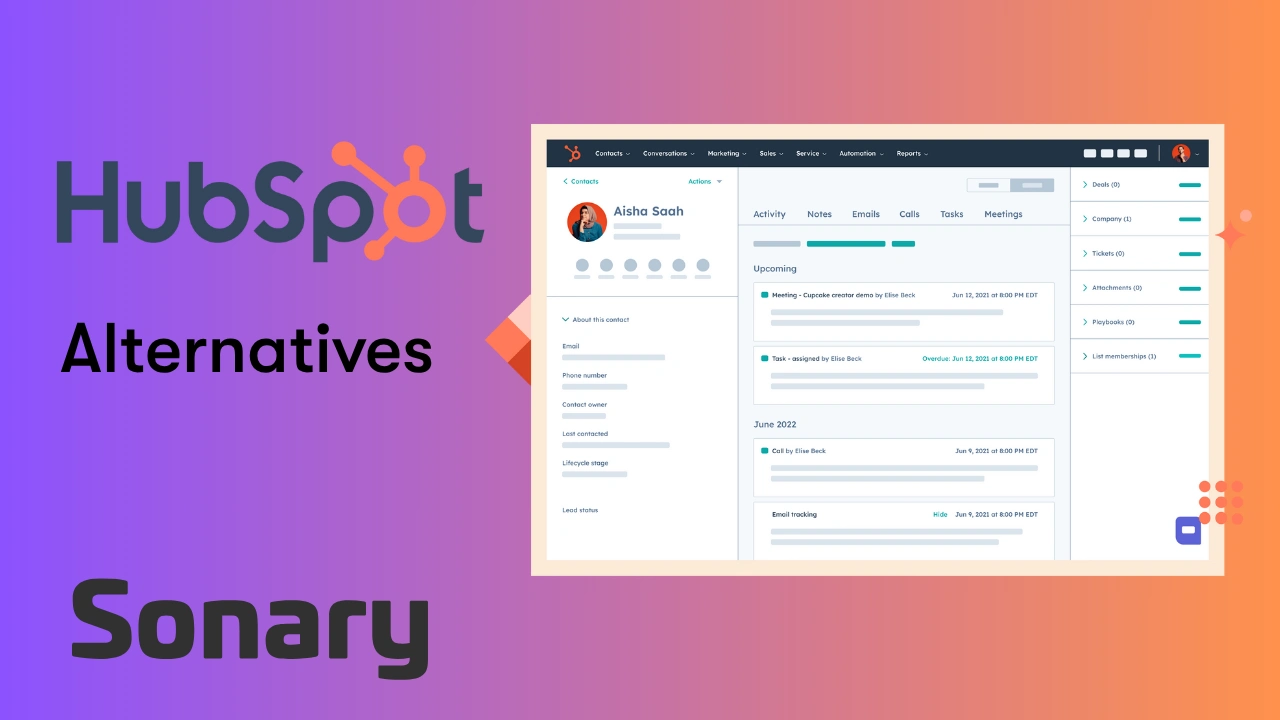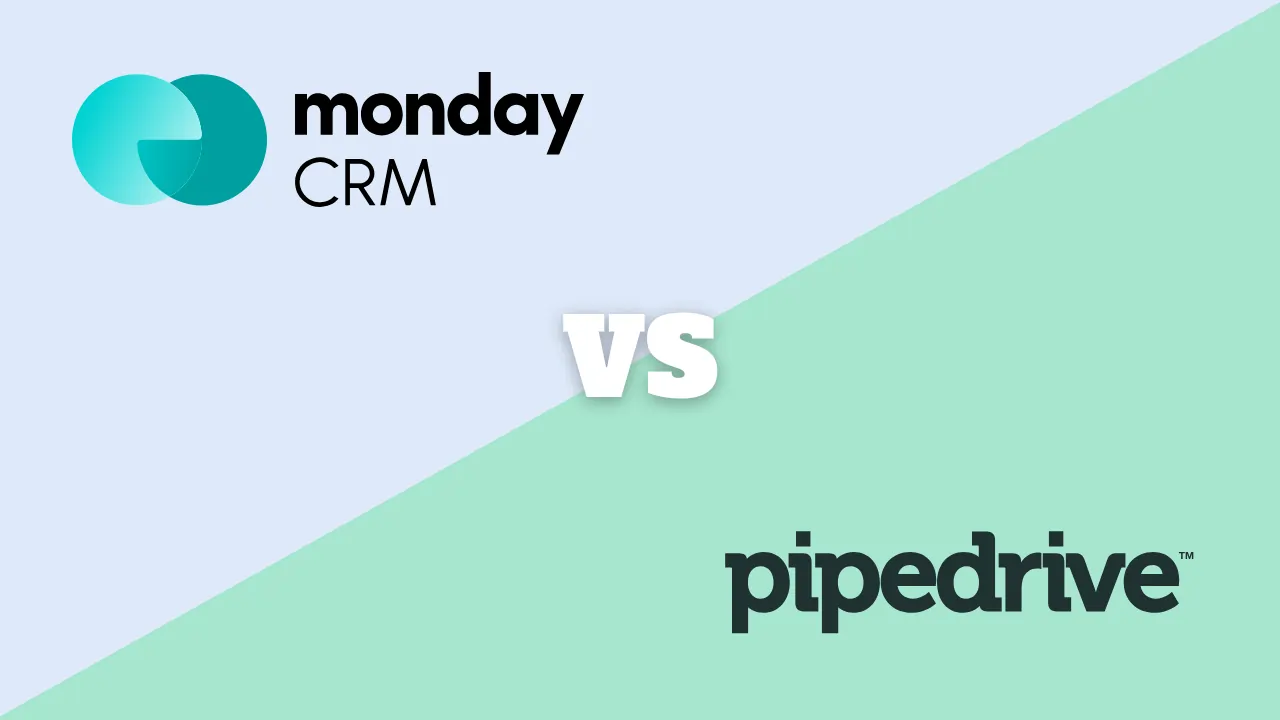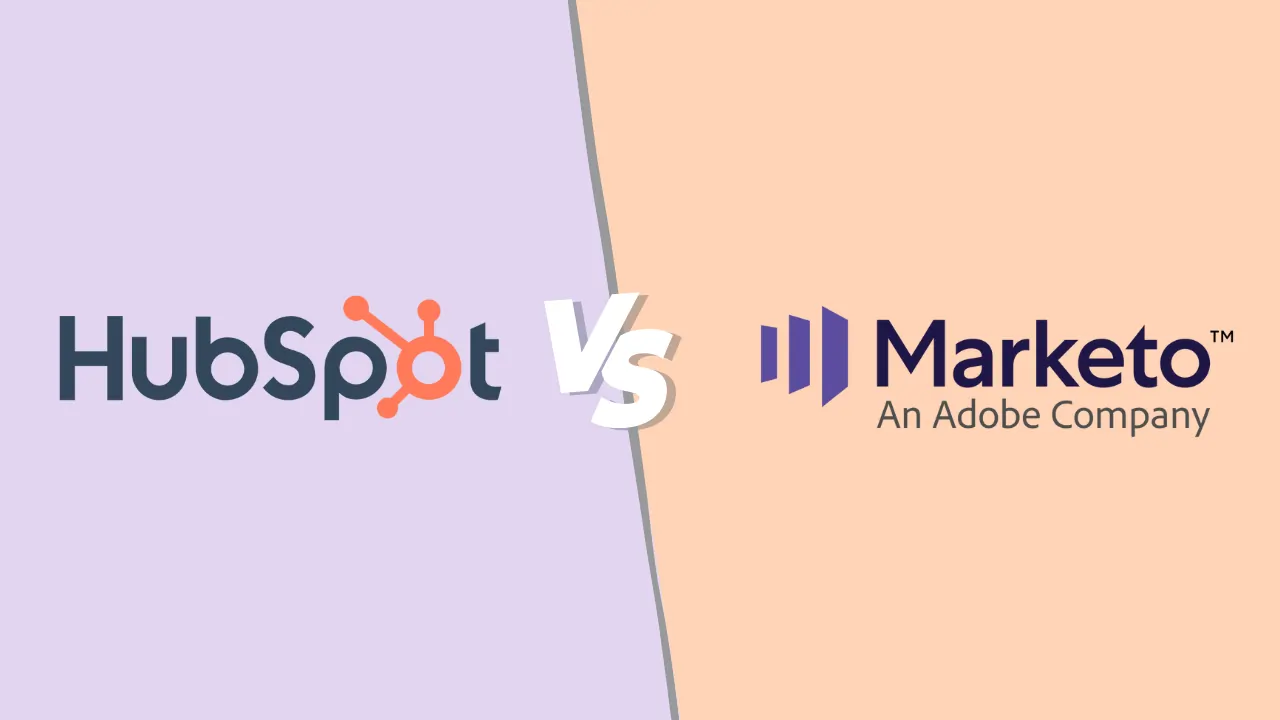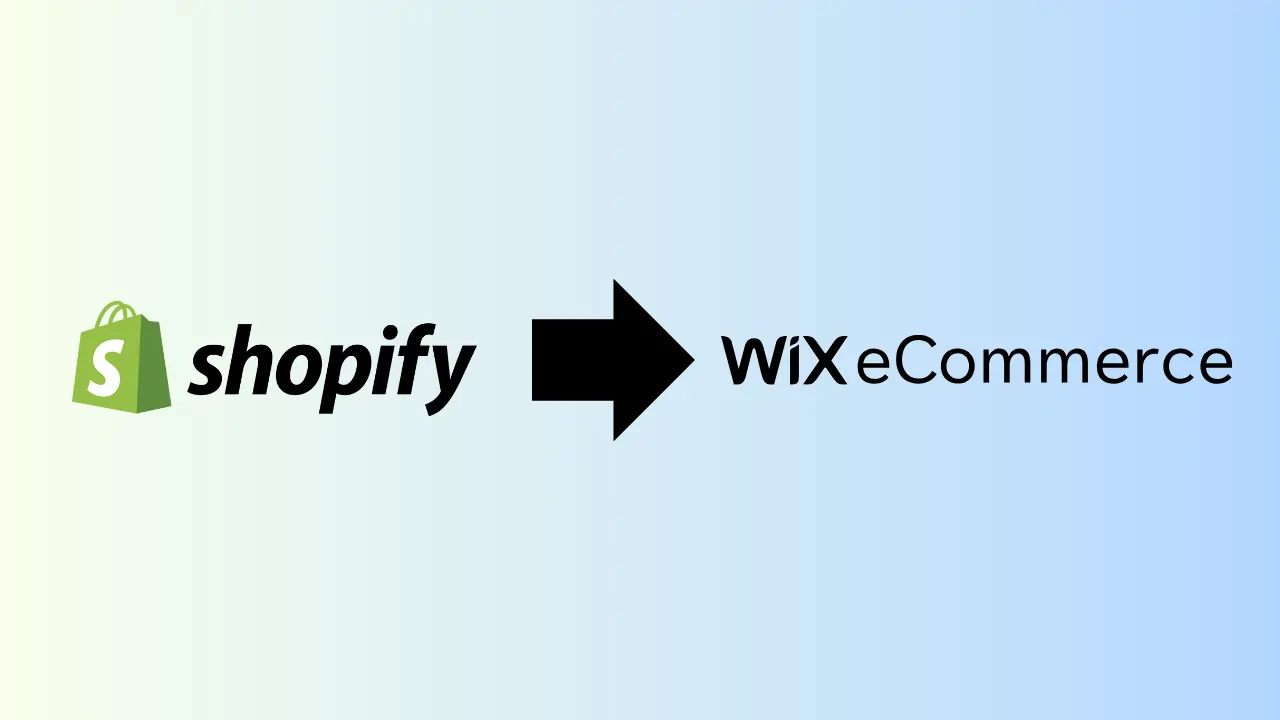CRM Statistics for 2026: Boosting Connections and Sales

Customer Relationship Management (CRM) systems have evolved from basic contact management tools to sophisticated platforms that drive sales, improve customer satisfaction, and enhance business efficiency. In 2024, the integration of artificial intelligence (AI) and other advanced technologies is reshaping the CRM landscape. Let’s explore the latest CRM statistics, trends, and insights, highlighting how businesses can leverage these tools to boost connections and sales.
How many CRM systems are there?
The CRM market is highly diverse, with numerous options available, ranging from cloud-based and mobile solutions to AI-integrated platforms. Businesses can choose from various CRM solutions to fit their specific needs, and the market continues to grow and evolve with technological advancements.
The Rise of CRMs and AI Integration
Artificial Intelligence is no longer a futuristic concept but a practical tool embedded within CRM systems. The convergence of AI with CRM technologies is revolutionizing customer relationship management by enhancing capabilities and providing deeper insights.
Enhanced Customer Insights
- With the global market for AI in CRMs forecasted to reach an impressive $80 billion by 2025, artificial intelligence is proving itself to be a pivotal force shaping the present landscape. AI capability in CRM software is rapidly establishing itself as an essential component of modern business strategies, driving innovation and transformation in customer relationship management.
- In 2024, AI integration will allow businesses to understand customer behaviors better, forecast future trends, and improve productivity through automation. A majority of organizations view AI in CRM software as transformative, with 74% already experiencing an increase in lead conversion rates of over 10%.
Automation of Routine Tasks
- AI excels in automating repetitive tasks, freeing up valuable time for sales and customer service teams. Automation features such as lead scoring, email follow-ups, and data entry are increasingly common.
- AI-powered CRMs can significantly enhance sales productivity, with potential boosts of up to 40% in team efficiency and 35% in overall productivity. Additionally, they can increase pipeline conversions by 56%, making AI an essential tool for driving success in modern sales strategies.
Predictive Analytics
- AI-powered predictive analytics are revolutionizing CRM systems by providing businesses with the ability to forecast future customer behaviors, preferences, and needs. By analyzing historical data, AI enables companies to tailor their marketing strategies and improve customer engagement proactively. For instance, Netflix leverages its AI-driven predictive analytics to recommend shows and movies based on users’ viewing histories, significantly enhancing user satisfaction and interaction.
- Predictive analytics has become an indispensable component of CRM systems, offering valuable insights for forecasting trends, customer behaviors, and sales opportunities. Eighty percent of sales and marketing executives say predictive analytics and AI can improve sales.
Best CRM Providers
 Sync emails to track client interactions
Sync emails to track client interactions  Import leads with integrations
Import leads with integrations  Mobile app means you never miss a sale
Mobile app means you never miss a sale  300+ integrations enhance functionality
300+ integrations enhance functionality  Track contacts & manage sales pipeline
Track contacts & manage sales pipeline  Get a complete view of every customer
Get a complete view of every customer Chatbots and Virtual Assistants
AI chatbots and virtual assistants are enhancing customer service by providing instant support and handling routine inquiries.
- These AI-powered tools have been shown to reduce customer service costs by 30%.
- Among companies with more than 10,000 employees, a whopping 91% have integrated AI into their CRM systems. Furthermore, 42% of businesses across various industries have already incorporated AI into their CRM strategies, reflecting a broad adoption of this technology to enhance customer relationship management.
- According to recent data, 87.2% of consumers view their interactions with chatbots as neutral or positive. Additionally, 62% of respondents prefer interacting with digital assistants for customer service over waiting for human agents. Chatbots can automate up to 30% of the tasks currently handled by contact center staff, potentially saving $23 billion in the U.S. alone.
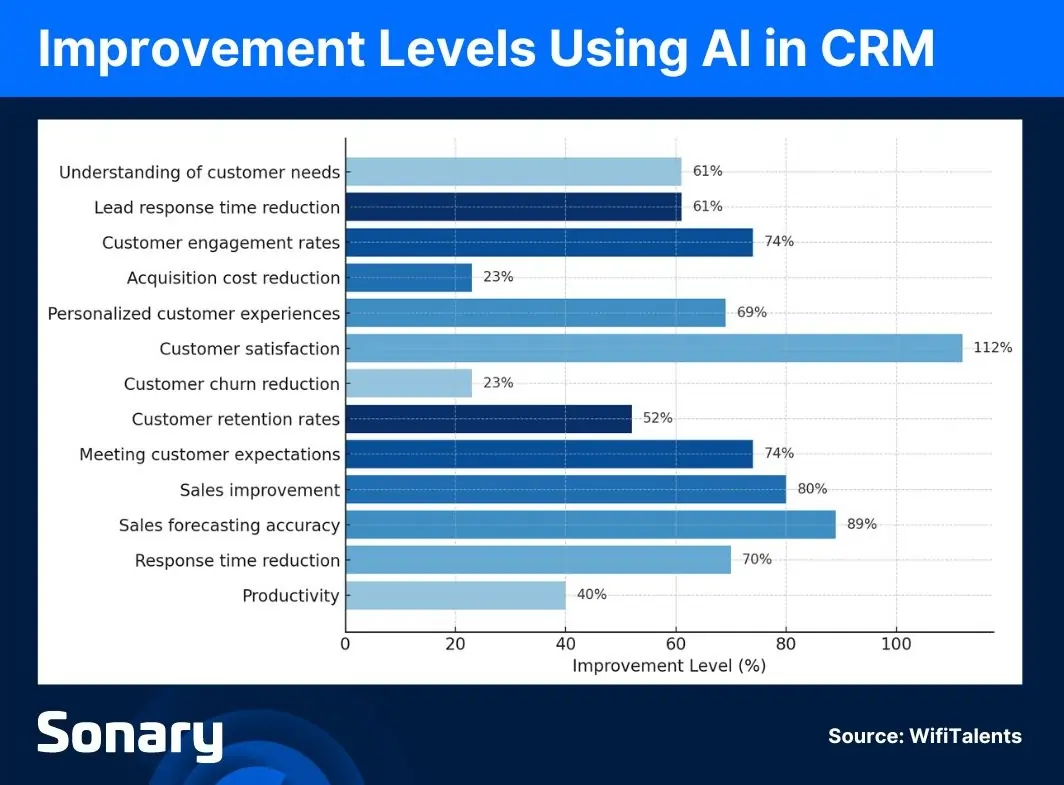
|
Business areas using AI in CRMs |
Improvement level |
|
Productivity |
40% |
|
Response time reduction |
70% |
|
Sales forecasting accuracy |
89% |
|
Sales improvement |
80% |
|
Meeting customer expectations |
74% |
|
Customer retention rates |
52% |
|
Customer churn reduction |
23% |
|
Customer satisfaction |
112% |
|
Personalized customer experiences |
69% |
|
Acquisition cost reduction |
23% |
|
Customer engagement rates |
74% |
|
Lead response time reduction |
61% |
|
Understanding of customer needs |
61% |
Source: WifiTalents
CRM Facts: Market Trends for 2024
CRM usage continues to grow rapidly, driven by technological advancements and evolving business needs. Understanding these trends can help you make informed decisions about your business’s CRM strategies.
Increasing Market Size
- In 2024, the CRM software market is anticipated to generate revenues totaling approximately U.S. $89.30 billion.
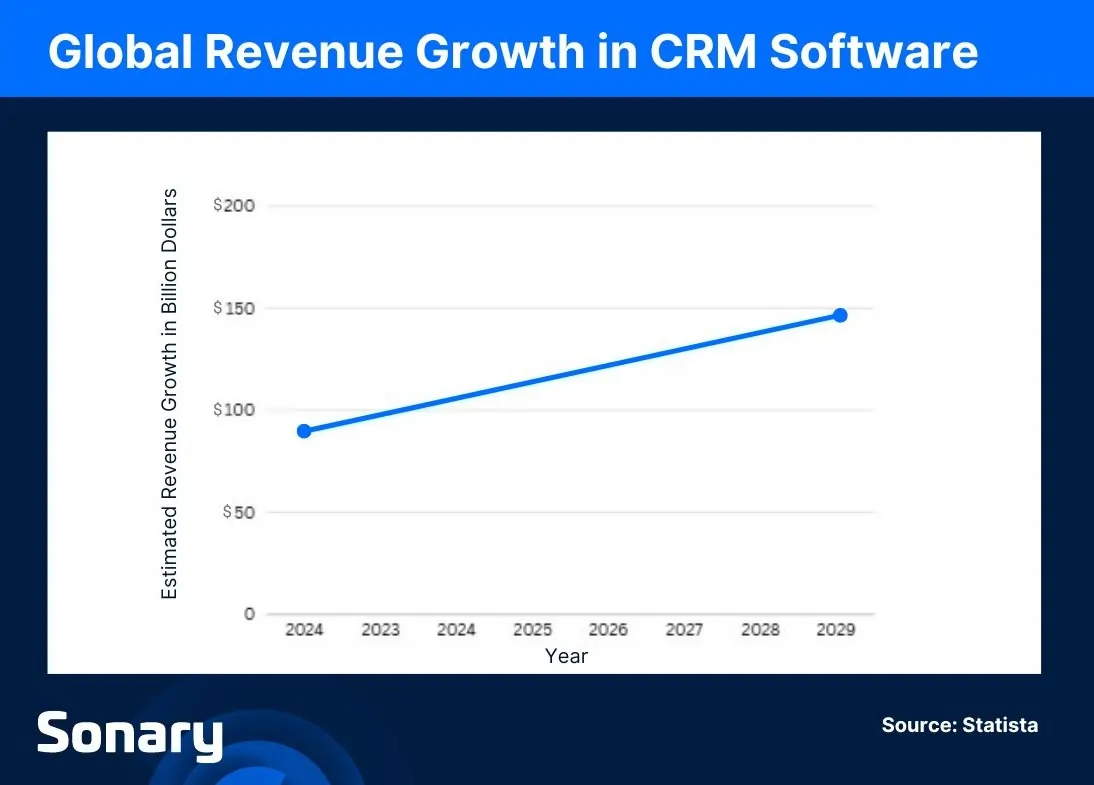
Source: Statista
- Looking forward, this market is expected to experience a robust compound annual growth rate (CAGR) of 10.35% between 2024 and 2029. This sustained CRM growth trajectory is projected to drive the market’s total revenue to an estimated U.S. $146.10 billion by 2029.
Cloud-Based CRM Solutions
Cloud-based CRM solutions are becoming the norm due to their scalability, flexibility, and cost-effectiveness.
- Eighty-seven percent of businesses utilize cloud-based CRM platforms. While CRMs are designed to collect and store data, they can either store it locally on your computer or in the cloud. The majority of businesses prefer cloud-based CRMs to mitigate the risk of data loss due to local network breaches or computer failures. Cloud storage offers a more secure and reliable solution, ensuring that valuable customer data remains protected and accessible, even if local systems are compromised.
- This trend is expected to continue: Cloud-based CRMs are projected to expand at an estimated compound annual growth rate (CAGR) of 13.43% by 2027.
Related Articles
Mobile CRM Adoption
With the rise of remote and hybrid work environments, mobile CRM solutions are increasingly important. Mobile CRM apps allow sales and support teams to access customer data, manage tasks, and update records while on the go.
- The global mobile CRM market is projected to reach $52.4 billion by 2029, with an estimated compound annual growth rate (CAGR) of 10.4%.
- Currently, 27% of the global CRM market is dedicated to software compatible with mobile devices, with North America holding the largest share at 25.7%, driven by the presence of major enterprises and their extensive customer base. In contrast, developed economies in Europe account for 20% of global mobile CRM sales. Meanwhile, the Middle East and Africa represent the smallest market share, at just 3.7%.
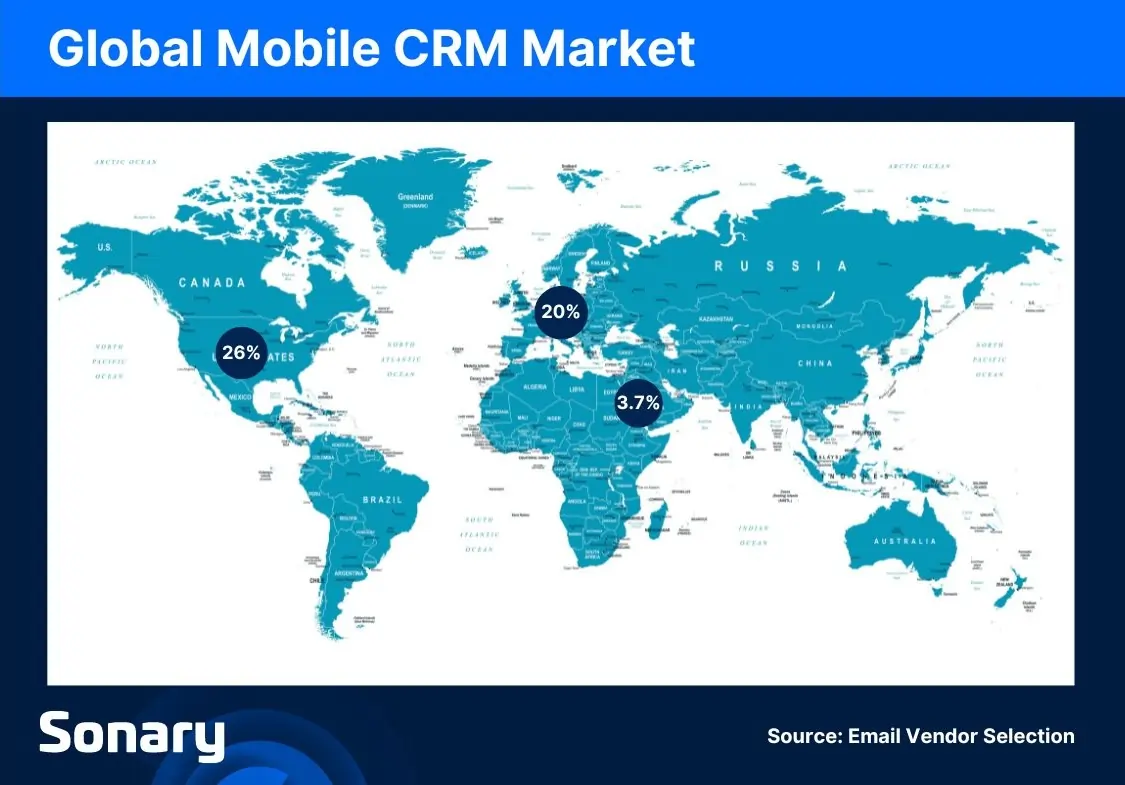
|
Region |
Market share |
|
North America |
25.7% |
|
Europe |
20% |
|
Middle East and Africa |
3.7% |
Source: Email Vendor Selection
Integration with Other Business Tools
The integration of CRM systems with other business tools is crucial for maximizing their effectiveness.
- Integrating CRM systems with tools like email marketing platforms, sales automation software, and customer service apps can significantly boost sales performance, as 59% of organizations report improved close rates due to these integrations.
- Additionally, 52% of companies find that CRM integration opens up new market opportunities. Despite the potential benefits, only 28% of the 976 applications companies use on average are currently integrated with their CRM systems, highlighting a significant area for optimization.
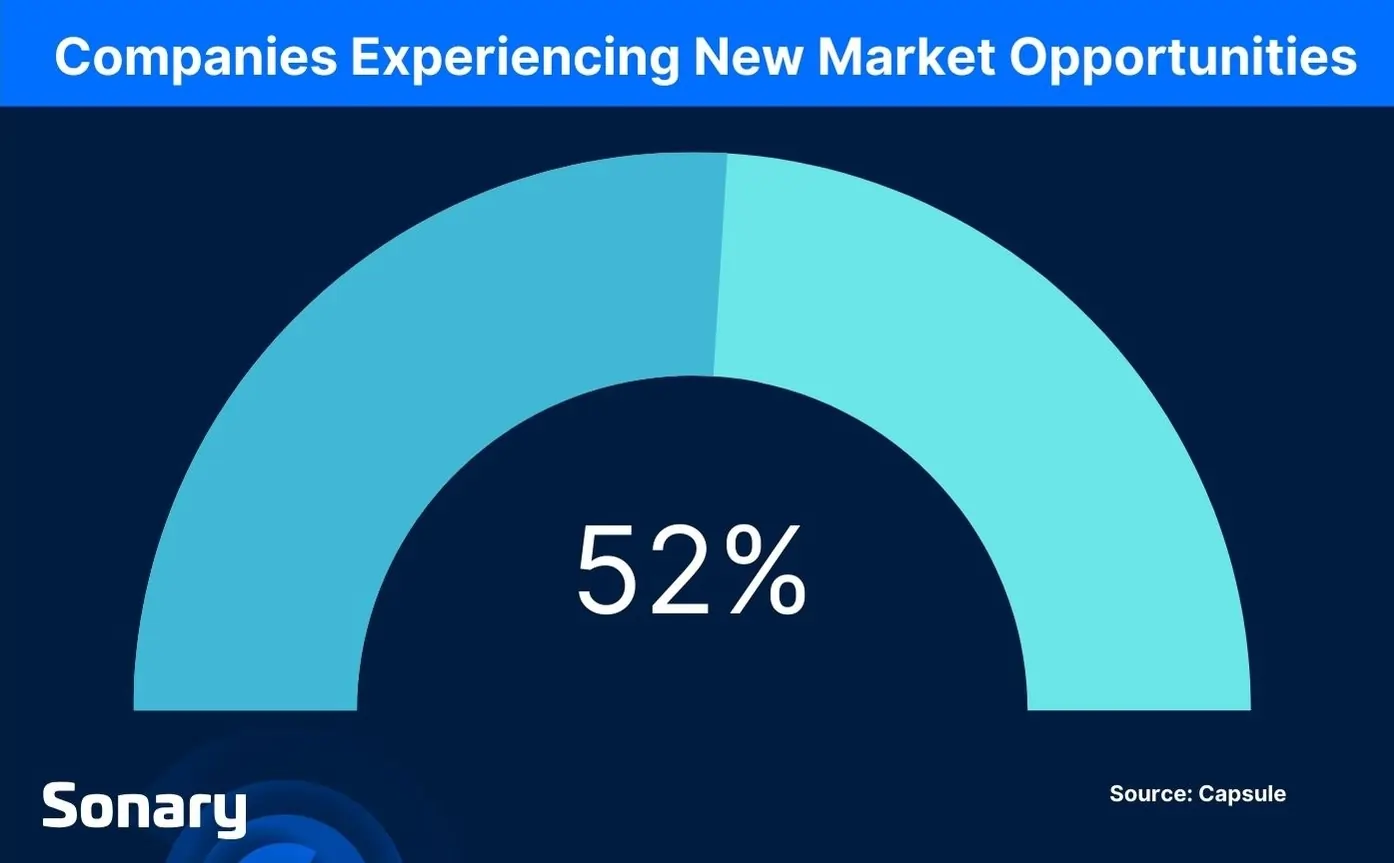
Source: Capsule CRM
- According to a CRM buyer survey, the primary challenges most companies aim to address with CRM adoption are contact management (50%), sales management (33%), and lead generation (33%). In addition to these priorities, businesses are also seeking CRM software that can automate specific sales tasks and processes (45%), offer extensive integrations (36%), and provide strong support for their field workers (20%).
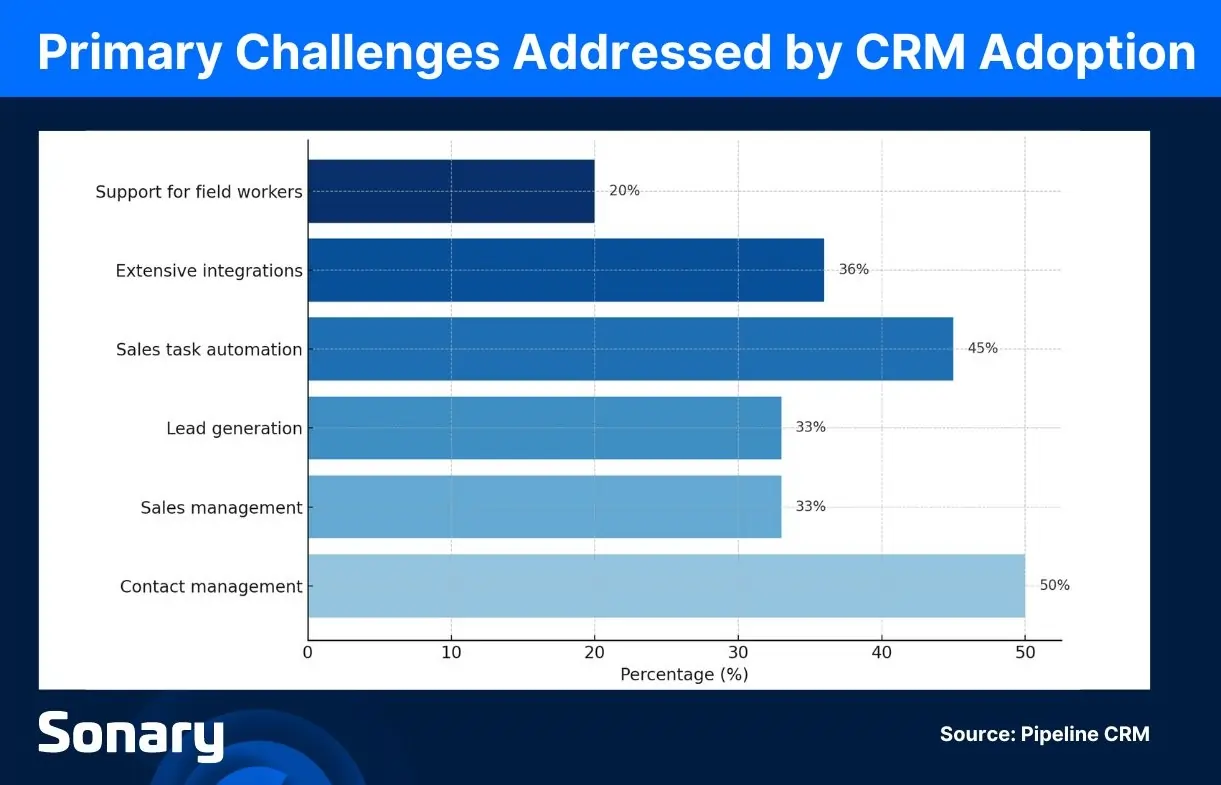
- The integration of CRM systems with social media platforms is becoming increasingly important. The COVID-19 pandemic was crucial in accelerating this integration. Hootsuite, a social media management platform, reported a 110% increase in social media messaging during the pandemic, highlighting its rise as the preferred channel for customer service communication.
Are CRMs Worth the Investment?
Investing in a CRM system can be a significant financial commitment. Here’s a closer look at whether CRMs are worth the investment based on recent statistics:
ROI on CRM Investments
CRM utilization offers a substantial return on investment (ROI). A forecasted ROI rate of 1.5 times indicates that businesses can expect to earn $45.72 or more for every dollar invested in CRMs in 2024. Even more impressive, this substantial return on investment can be achieved in just six months or less, making a CRM not only a highly profitable tool but also a quick and efficient investment for businesses looking to enhance their customer relationships and operational efficiency.
Cost of CRM Implementation
The cost of implementing a CRM system varies depending on the size of the business and the complexity of the solution. Despite the initial cost, the long-term benefits and ROI often justify the investment.
- Integrating a CRM system typically ranges in cost from $6,000 to $24,000 per integration, with the exact amount depending on whether it’s a legacy system or a web service.
- Expect to budget on the higher end for legacy systems, as integration often requires direct interaction with the database and the development of custom business logic to ensure proper functionality.
- On the other hand, integrations with web services generally cost on the lower end of the spectrum. If the system to be integrated has an API but lacks a web service, the cost is likely to be around $18,000.
Increased Efficiency and Productivity
CRM systems contribute to greater efficiency and productivity within organizations. These improvements are largely due to automated processes, streamlined workflows, and better data management capabilities.
- CRMs enhance productivity by providing instant access to sales and marketing data. For example, when companies incorporate mobile access and social media features into their CRM tools, sales team productivity improves by 26.4%.
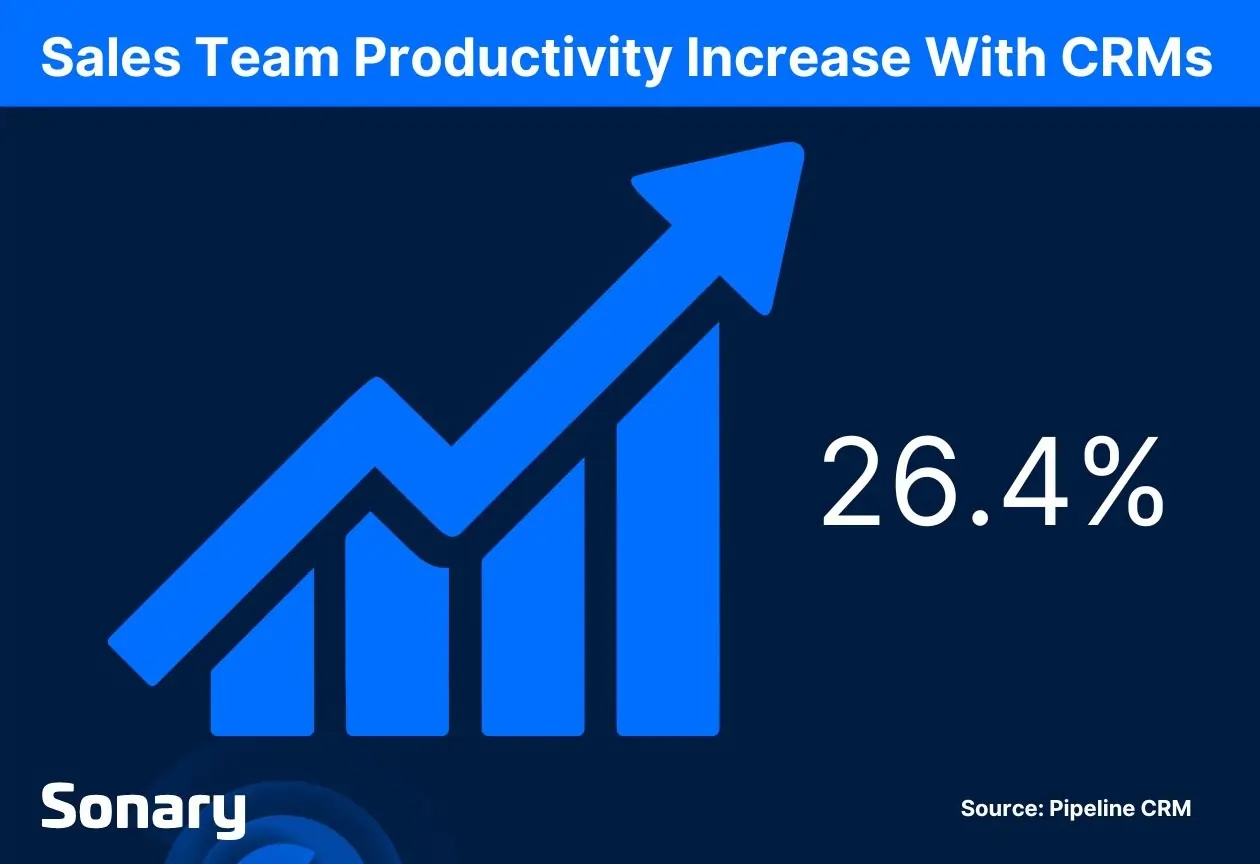
Source: LinkPoint360
Sales and Marketing Alignment
CRM systems significantly boost business revenue, as evidenced by a study revealing a 41% increase in profits per sales representative. This surge in revenue is driven by higher conversion rates, increased customer satisfaction, and improved sales workflows.
The Future of CRM: Key Trends
As systems evolve, several key CRM market trends are emerging:
- Greater AI integration: AI advancements in machine learning, natural language processing, and data analytics will enhance predictive analytics, customer segmentation, and automation in CRM systems.
- Enhanced customer experience: Future CRMs will focus on personalization, real-time engagement, and seamless omnichannel communication to deliver exceptional customer experiences.
- Increased data privacy and security: To address growing concerns about data privacy, enhanced security features and compliance with data protection regulations will become standard.
- Integration with emerging technologies: CRM systems will increasingly integrate with technologies like the Internet of Things (IoT) and blockchain, offering real-time data and improved security.
Final Thoughts
CRM systems are evolving rapidly, with AI integration and emerging technologies driving new capabilities and opportunities. Businesses that leverage these advancements can expect significant improvements in customer relationships, sales performance, and overall efficiency. Staying informed about the latest CRM statistics and trends will be crucial for making informed decisions and maximizing the benefits of CRM investments.
Whether integrating AI, exploring market trends, or investing in CRM solutions, businesses have more tools than ever to enhance their customer interactions and drive growth. The continued evolution of CRM systems promises even greater opportunities for success in the coming years.
FAQs
Q: How is AI changing the CRM landscape?
A: Artificial Intelligence (AI) is transforming Customer Relationship Management (CRM) systems by enhancing their capabilities and providing deeper insights. AI integration allows businesses to better understand customer behaviors, forecast trends, and improve productivity through automation. For instance, AI-powered predictive analytics can forecast future customer needs, while chatbots and virtual assistants handle routine inquiries, improving customer service and reducing costs.
Q: What are the latest trends in the CRM market for 2024?
A: In 2024, the CRM market is expected to generate approximately $89.30 billion in revenue, with a projected compound annual growth rate (CAGR) of 10.35% through 2029. Key trends include the widespread adoption of cloud-based CRM solutions, which offer scalability and cost-effectiveness, and the growing importance of mobile CRM, with the global market expected to reach $52.4 billion by 2029. Additionally, CRM integrations with other business tools are becoming crucial for maximizing effectiveness and expanding market opportunities.
Q: What are the benefits of integrating AI into CRM systems?
A: Integrating AI into CRM systems offers numerous benefits, including enhanced customer insights, automation of routine tasks, and improved predictive analytics. AI enables businesses to understand customer behaviors and preferences better, automate repetitive tasks such as lead scoring and email follow-ups, and forecast future customer needs. This integration helps increase lead conversion rates, reduce time spent on routine tasks, and enhance overall customer engagement.
Q: What should businesses consider when investing in CRM systems?
A: When investing in CRM systems, businesses should consider both the cost and the potential return on investment (ROI). CRM systems typically range from $6,000 to $24,000 per integration, depending on whether the system is a legacy system or a web service. Despite the initial costs, CRM systems offer significant ROI, with businesses expected to earn $45.72 or more for every dollar invested by 2024. Additionally, CRM systems contribute to increased efficiency, productivity, and revenue, making them a valuable investment for enhancing customer relationships and business performance.






